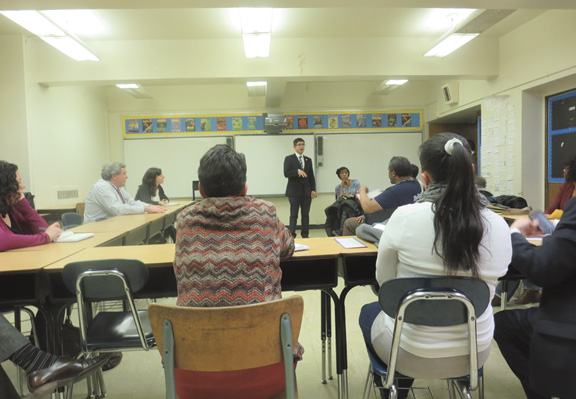Although advertised as one, there were actually two separate meetings at PS 15 on March 6th. The auditorium held an informational meeting where affected homeowners could meet representatives from Build It Back, a city program that is supposed to distribute federal funds to distressed homeowners who have had to rebuild their homes.

After some opening statements, councilman Carlos Menchaca led a group of tenants of the Red Hook Houses upstairs to room 202, where they met with two representatives from NYCHA.
Doug McNevin and Jessica Nepomiachi engaged the tenants in a back and forth that was sometimes emotional as tenants described some of the problems they faced both during and since the hurricane disrupted the electric and heating systems in all the buildings.
McNevin spoke about the temporary boilers that are still providing the steam heat. Since their emergency installation over a year ago, there have been problems with outages and extremely hot water coming out of the tap. He explained that they had to scramble to get these boilers, as Sandy created a huge demand for them. The two they ended up getting are oil powered and high pressured. In the next 90 days, they will be replacing them with more appropriate temporary boilers, powered by less polluting and less expensive natural gas. There will be a backup system providing more continuity of service, and hopefully they will be more adjustable, providing less surprises out of the tap.
The long-term plan is for a co-generation unit to replace this temporary situation. Discussions are underway to design one unit that would provide heat for the entire complex. In addition, they would be designed to produce electricity as well, which would feed into the Con Ed grid, lowering electricity costs.
Upon questioning, it was discovered that these are very long-term plans, contingent on finding a capital source. NYCHA is entitled to insurance reimbursement for the boilers, as well as FEMA money, however, as with many individuals they haven’t received a penny so far.

The usual litany of complaints were heard, including terrible plastering and painting problems, front door locks that are still broken, and lost work orders. It was pointed out that the existing temporary boilers are so unreliable that one of them even caught fire.
Sheryl Braxton expressed her disgust throughout the meeting, as the NYCHA people tried to answer her questions and assured her that her pleas would be heard. Menchaca listened impassionately at the head of the group, occasionally clarifying some points, and, except for Braxton, who spoke at will, picked on people to speak.
Menchaca pointed out that in the new city budget, NYCHA is relieved of paying $52 million to the NYPD. Nepomiatchi was pressed on what they will do with the windfall. She responded that this has only just happened but that they will surely start hiring more maintenance people.
Ricardo Reed spoke of sewage backups.








